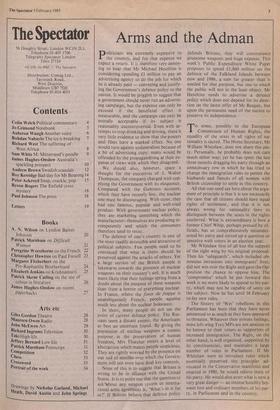Arms and the Adman
113I oliticians are extremely expensive to 1. the country, and for that expense we expect a return. It is therefore very annoy- ing to hear that Mr Michael Heseltine is considering spending £1 million to pay an advertising agency to do the job for which he is already paid — conveying and justify- ing the Government's defence policy to the nation. It would be priggish to suggest that a government should never run an advertis- ing campaign, but the expense can only be excused if the beneficial effect is measurable, and the campaign can only be morally acceptable if its subject is reasonably uncontroversial. Even with at- tempts to stop drinking and driving, there is very little evidence to show that the posters and films have a marked effect. No one would turn against unilateralism because of a bit of advertising copy: many would be offended by the propagandising at their ex- pense of views with which they disagreed.
We should also, however, spare a thought for the executives of J. Walter Thompson, the company charged with sup- plying the Government with its eloquence. Compared with the Guinness account, which they have recently lost, the nuclear one must be discouraging. With stout, they had one famous, popular and well-tried product. With government nuclear policy, they are marketing something which the manufacturers themselves are producing in- competently and which the consumers therefore tend to resist.
The defence of one's country is one of the most readily accessible and attractive of political subjects. Few people need to be convinced that what is theirs should be preserved against the attacks of others. Yet a large section of the British people is lukewarm towards the presence of nuclear weapons on their country's soil. It is much more likely that their feelings spring from a doubt about the purpose of these weapons than from a horror of everything nuclear. In France, where the force de frappe is unambiguously French, people agonise much less about the nuclear holocaust.
In short, many people do not see the point of current defence policy. The Rus- sians seem a distant enemy, the Americans at best an uncertain friend. By giving the possession of nuclear weapons a cosmic purpose in the preservation of human freedom, Mrs Thatcher enters a level of abstraction which makes people suspicious. They are rightly worried by the presence on our soil of missiles over which the Govern- ment will not even have dual key controls.
None of this is to suggest that Britain is wrong to be in alliance with the United States. It is to point out that the question to askNibout any weapon system or interna- tional arms agreement is, 'What's in it for us?' If Britons believe that defence policy defends Britons, they will countenance gruesome weapons and huge expense. This week's Public Expenditure White Paper proposes to spend £1,860 million on the defence of the Falkland Islands between now and 1986, a sum far greater than is needed for that purpose, but one to which the public will not in the least object. Mr Heseltine needs to advertise a defence policy which does not depend for its direc- tion on the latest offer of Mr Reagan, but upon the permanent need of the nation to preserve its independence, o some, possibly to the European Commission of Human Rights, the equality of the sexes in all rights of na- tionality is sacred. The Home Secretary, Mr William Whitelaw, does not share this pie- ty. Personally, he probably does not care much either way; yet he has spent the last three months dragging his party through an unnecessary row in which he has tried to change the immigration rules to permit the husbands and fiances of all women with British citizenship to settle in this country. All that one need say here about the argu- ment of principle is that it is not necessarily the case that all citizens should have equal rights of settlement, and that it is not always wrong for nationality laws to distinguish between the sexes in the rights conferred. What is extraordinary is how a former Chief Whip, perhaps pressed by of- ficials, has so comprehensively misunder- stood his party and stirred up a question so sensitive with voters in an election year.
Mr Whitelaw first of all lost the support of the right wing by his original proposal. Then his 'safeguards', which included ob- noxious intrusions into immigrants' lives, did not win over the Right and gave the Op- position the chance to oppose him. The 'compromise' which he put forward this week is no more likely to appeal to his par- ty, which may not be capable of unity on the subject. Now he has until 16 February to lay new rules, The history of 'Wet' rebellions in this Parliament has been that they have never amounted to as much as they have appeared to threaten. Whatever their private feelings, most left-wing Tory MPs are not anxious to be known to their voters as supporters of increased immigration. The Right, on the other hand, is well organised, supported by its constituencies, and maintains a large number of votes in Parliament. If Mr Whitelaw were to introduce rules which essentially preserved the principles ad- vocated in the Conservative manifesto and enacted in 1980, he would relieve most of his party. He would also avert what is now a very great danger — an intense hostility bet- ween him and ordinary members of his par- ty, in Parliament and in the country.














 Previous page
Previous page